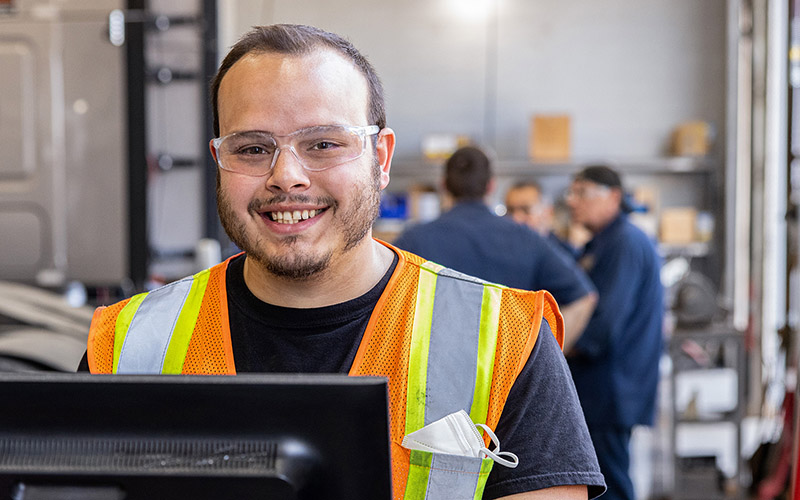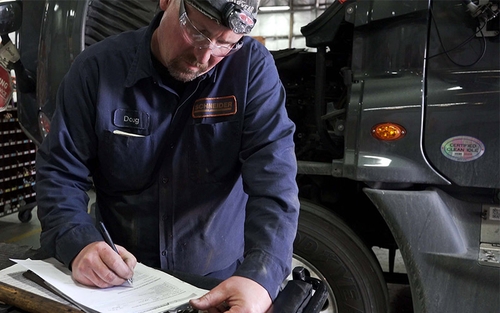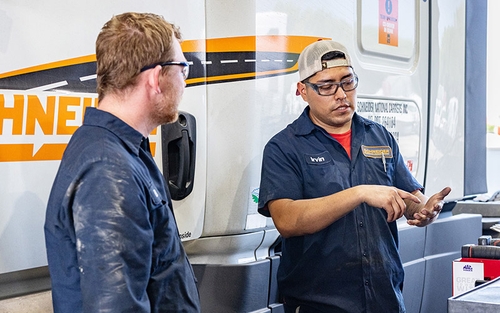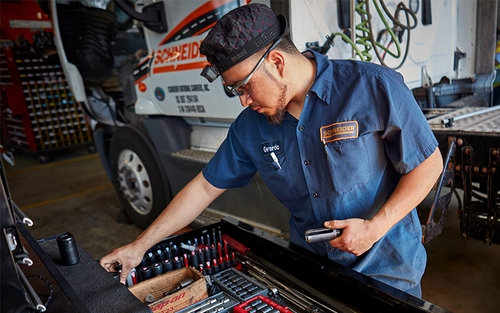Is being a diesel technician a good career? 13 pros and cons


By The Schneider Guy
Estimated reading time: 4 minutes
Diesel technicians have one of the most important jobs in the transportation industry. They are on the front lines, working hard to keep trucks, drivers and the economy moving.
Although the work itself is rewarding, you might find yourself asking, “is being a diesel technician worth it?” Like any opportunity, it’s important to review the pros and cons before deciding if being a diesel technician is a good career for you.
7 benefits of being a diesel technician
1. Diesel technicians make good money.
Per the Bureau of Labor Statistics (BLS), the median pay for diesel technicians was $58,970 per year, or $28.35 per hour, in 2023. However, how much a technician makes depends on several factors, including their:
- Geographic location.
- Work schedule.
- Level of technical skills and abilities.
2. Diesel technicians have opportunities for extra pay.
Most diesel technicians earn hourly pay. This means they are compensated for every minute they are working.
Many companies, like Schneider, offer ways to earn more money, such as:
- Sign-on bonuses.
- Shift differential for working second and third shift.
- Extra pay when working weekends.
- Overtime opportunities.
3. Diesel technicians have a promising job outlook.
The job outlook for diesel technicians is very positive. Over the next decade, the BLS predicts there will be about 24,300 job openings for diesel service technicians every year.
Diesel technicians will always be in high demand. People will always need to buy food and supplies, which means semi-trucks are always going to be needed to deliver these goods. In turn, that means diesel technicians will always be needed to maintain and repair the trucks.
4. Diesel technicians have career advancement opportunities.
Diesel technicians have a ton of opportunity to grow their career, in a variety of ways, too. Some of the most common ways diesel technicians advance their careers is by:
- Moving into more advanced technician roles, such as:
- Senior diesel technician.
- Lead diesel technician.
- Master diesel technician.
- Taking on a shop leadership role.
- Becoming a mobile diesel technician.
Especially when working for a large organization, such as Schneider, the career growth opportunities typically are endless.
5. Diesel technicians have flexible shift options.
As you debate whether being a diesel technician is a good job for you, it's worth considering how the role aligns with your lifestyle.
Many companies that hire diesel technicians are 24/7 companies. This means they have first, second and third shift opportunities for maintenance associates to pick from, as well as part-time and weekend options.
Schneider even offers four-day workweeks at many of its shops. This makes it easy for fleet technicians to find a work schedule that aligns with their life at home.
6. Diesel technicians can choose where they live and work.
There’s hardly any place where diesel technicians aren’t needed. Wherever diesel engines operate, there’s bound to be a career opportunity nearby.
Schneider, for example, has a nationwide network of shops located near many of the country’s major transportation corridors. We also have positions available at many of our customer locations, so it’s easy to find a job opportunity that fits your geographic preferences.
7. Diesel technicians receive on-the-job training.
Many large companies, like Schneider, train their diesel technicians while they’re on-the-job. This training helps diesel technicians become more skilled in their trade and opens more doors to opportunities.
6 challenges of being a diesel technician
1. The job is physically demanding.
Diesel technicians are on their feet all day, working on heavy equipment with heavy-duty tools.
If you’re someone who prefers to sit at a desk, being a diesel technician may not be the right fit for you. If you want to use your hands to fix things and move around throughout your workday, it could be a perfect fit.
2. Not all shops are climate controlled.
Diesel shops can be warm in summer and cold in the winter. That's why it’s important to find a company that provides high-quality uniforms and maintains their shops well.
3. No two days are the same.
A diesel technician’s work is very hands-on and varies from day to day. One moment they might be replacing a blown tire and the next they could be engaged in an intensive engine repair. The equipment they work on can also change.
Some diesel technicians even travel outside the shop for repairs. Schneider’s mobile diesel technicians travel to customer sites, distribution centers and rail yards to work on Schneider equipment.
4. Safety must always come first.
On top of the heavy equipment, shops can have oil spills, chemicals and trip hazards, which can create a more dangerous work environment. This is why it is vital to work for a company that puts safety first and provides proper gear and tooling to help mitigate these risks.
5. The job requires specialized skills.
Becoming a diesel technician takes a wide range of specialized skills and abilities that not many people have. To be a good diesel technician, you need to be someone who has the expertise needed to work with new technology and diagnostic software, as well as the hands-on capability to fix the issue.
6. There’s always something new to learn.
Diesel technicians’ jobs are always evolving, which means there is always a better, more advanced way to do something. The need to keep up on your knowledge and skills may feel overwhelming at first as a new diesel technician.
ood companies provide top-notch training that makes it more attainable and less daunting to grow your skills.
Learn how to become a diesel technician.

Schneider Guy loves the "Big Orange." He's passionate about the trucking industry and connecting people to rewarding careers within it. He's been the eyes and ears of our company since our founding in 1935, and he's excited to interact with prospective and current Schneider associates through "A Slice of Orange."



